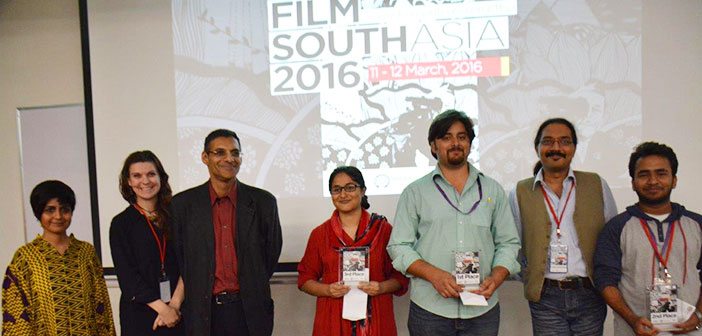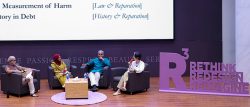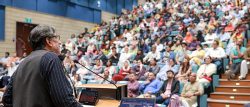Habib University’s Center for Media and Design and the Yohsin Center for Social Development came together on March 11th and 12th to conduct the Travelling Film South Asia Festival on campus. Along with screenings of 11 selected nonfiction productions, the TFSA 2016 also exhibited three winning Habib University Student contributions as well. The films screened at the event had been selected by the Film South Asia jury from over 42 documentaries and non-fiction films in 2015, in Kathmandu.
Film Southasia (FSA) is a biennial festival that was set up in 1997 with the goal of popularizing the documentaries so that it entertains, informs and changes lives. In addition to the festival that takes place in Kathmandu every two years, FSA organizes screenings, discussions and workshops across South Asia to promote South Asian non-fiction films and documentaries within the Subcontinent and around the world. Film South Asia believes that film is a powerful medium that helps to not only better represent the region internationally, but also contributes immensely in introspection and initiatives to bring change at the local level.
At the Travelling Film South Asia festival 2016, students as well as the general audience were shown screenings under “Women’s Narratives”, “Music as Politico-Cultural Expression”, “Violence and Displacement” and “Alternative Briefs”, each displaying three documentaries and films relevant to the broader discourse. Having started off with a brief opening address from the Interim Dean of the School of Arts, Humanities and Social Sciences, Dr. Asif Farrukhi, and representative of TFSA, Mr. Farjad Nabi, the screenings began on 4:15pm on Friday.
Each screening session concluded with a panel discussion in order for the panelists to reflect on the films, and comment on the discourse along with film-making techniques. The panelists included members of the Habib University faculty as well as celebrated film-makers, documentary makers, producers, directors and so on, such as Dr. Markus Heidingsfelder, Dr. Severine Minot, Mr. Farjad Nabi, Dr. Noman Baig, Dr. Hafeez Jamali, Dr. Sarah Humayun, Dr. Aaron Mulvany, Dr. Hasan Ali and Professor Saima Zaidi.
A wonderfully energetic musical performance was also arranged on Friday evening for the audience, for which the talented surando player Muhammad Hasan, and Mumtaz Sabzal on the banjo. The artists regaled the audience with instrumental renditions of some of the most famous and traditional folk music from Sindhi, Punjabi and Balochi cultures. Each performance was highly vibrant, and brought several audience members to their feet as they danced and clapped along, enjoying it fully as the night progressed.
Student contributions were also exhibited on Saturday, 12th March, under the Documentary Contribution. The first prize was taken by Ali Rizvi for his documentary “Sapna”, while the second was awarded to the documentary “Chotay” by Iqran Rasheed and the third prize to “Why Systems?” by Saima Jawed. Each winning documentary also received airtime for the panelists and guests, and received a lot of positive feedback from the audience for their depth and style of film-making.




